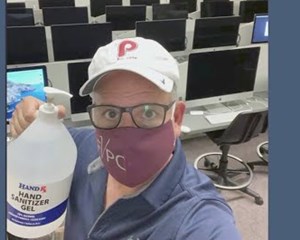AMNA NAWAZ: Now, this week, we have been looking at how the pandemic affected students, their lives and their learning. And, tonight, before we go, we're going to hear from teachers. These voices are part of our special report called "Disrupted: How COVID Changed Education" from the "PBS NewsHour" Student Reporting Labs. That's our network of high school journalism programs across the country.
RYANNE MESCHKAT, Teacher: If I can only think of one word to describe this year when it comes to teaching, it would be exhaustion, to be quite honest.
MICHAEL KAUFMAN, Teacher: We were trying desperately to figure out what was going on. We were building the plane while it was flying up in the air and hoping we weren't crashing and burning. We didn't know how to reach our students. Students didn't know how to reach us, and yet we were told, somehow, teach them.
MICHELLE CORO, Teacher: Tough is a nice way to put it. It's been frustrating. It's been annoying. It's been devastating.
SARI BETH ROSENBERG, Teacher: This will be my 19th year of teaching, but, let me tell you, it feels like my first year.
LAWRENCE CLARK, Teacher: This pandemic kind of forced us to adapt kind of on the fly.
MICHAEL CONRAD, Teacher: Every day, I never know how many kids I will have in my room.
SARI BETH ROSENBERG: What I have learned... Turn your camera on Thursday. ... is that one of the most important, important tools for teaching remotely is getting in touch with your own vulnerability and not being scared to share with your students.
CHRIS SLOAN, Teacher: Overnight, we had to switch modes, no more in person, all online. And it was quickly apparent that not everybody was joining the class. And I will never forget this moment. A student raises her hand and says: "We have got each other. Let's not forget that." And so she said: "I will reach out to so-and-so." Somebody else said: "Oh, I can text this person." And somebody else said: "I could swing by that person's house." And so, as a small group, I think we did a good job of looking out for each other.

RYANNE MESCHKAT: This year, I really tried to allow students to tell their own stories. And that's where the breakthroughs came. And the answers that I got were so thought-provoking for me, as a teacher, and really made me step back and think about my practice.
STU STEIN, Teacher: What do I wish people outside the classroom understood about this past year-and-a-half? The thing that's missing, the story that's missing in the national media, the national news is success. These kids have created a tremendous amount of success in these classrooms.
MAN: We have been pushing ourselves in ways unlike any other year, and it feels like we're going nowhere, but, at the end of the day, I really feel like we have gone somewhere. It's just a different space, and we're stronger, and we're better as a result.
MICHAEL CONRAD: The thing that keeps me coming back every morning are the new ideas, the fresh ideas, that are going to roll into next year.
LAWRENCE CLARK: There are good days and bad days. And the most important thing is that our kids need us, and we need to be there for them. So, thank you.
AMNA NAWAZ: And you can watch the entire program on the "NewsHour"'s YouTube page or on the Student Reporting Labs Web site.












